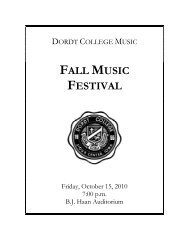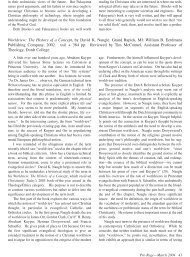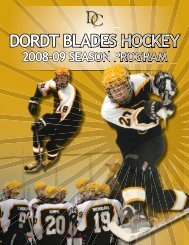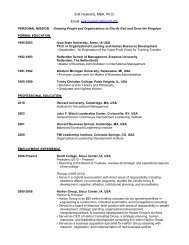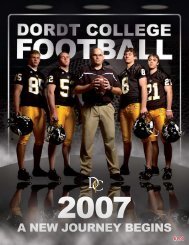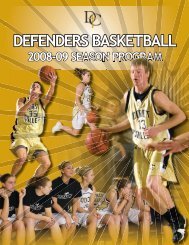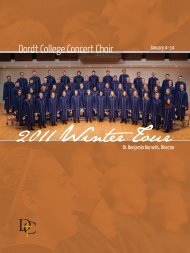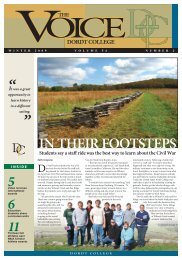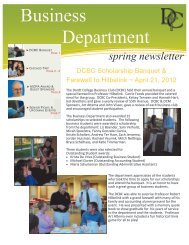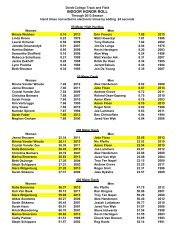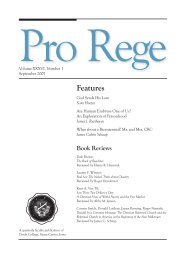June 2009 - Dordt College
June 2009 - Dordt College
June 2009 - Dordt College
Create successful ePaper yourself
Turn your PDF publications into a flip-book with our unique Google optimized e-Paper software.
that performance would have been very large and<br />
inclusive of some instruments that Handel did not<br />
use. The research of historical musicology into the<br />
orchestras of Handel’s time has led to a restoration<br />
of the original orchestration—and that was<br />
reflected in the SCOC’s recent performance.<br />
But in the last while, perhaps the past thirty<br />
years, a trend called “the new musicology” has<br />
emerged. The new musicologists appreciate the<br />
“embeddedness” of music in culture and have<br />
expanded musicological discourse to include<br />
more focus on sociological and cultural-historical<br />
questions. All sorts of new fields of musicological<br />
study have sprung up. Ethnomusicology is one;<br />
ethnomusicology studies the music of cultures<br />
different from our own. This new field is important<br />
to Wycliffe Bible Translators, which engages<br />
ethnomusicologists so that the music accompanying<br />
the Gospel to new cultures is accessible to and<br />
appropriate for that culture. Ethnomusicology is<br />
becoming a common course on college campuses;<br />
<strong>Dordt</strong> has one too—it’s called “Music in Non-<br />
Western Cultures.” (Two important goals of<br />
our <strong>Dordt</strong> course are understanding the music<br />
itself in musical terms and understanding the<br />
relationship of the musics of these cultures to their<br />
cultural contexts—religion, family, work, leisure,<br />
education, social protest, entertainment, etc.)<br />
Other new fields include music and gender,<br />
music and feminism, music and psychology. Not<br />
all musicologists agree; scholarly journals, conference<br />
discussions, and e-mail discussion lists all<br />
witness sharp dissensions between the historical<br />
musicologists, who believe strongly that the proper<br />
study of music is music, and the new musicologists,<br />
who believe equally strongly that music must<br />
be studied in relationship with other areas of human<br />
life and thinking.<br />
An interesting thing that has emerged in this<br />
tension is common acceptance that all scholars<br />
start with a point of view. Accordingly, all manner<br />
of voices are acceptable: feminist voices, Marxist<br />
voices, gay/lesbian voices—all are being accepted<br />
as legitimate voices, even if one does not agree<br />
with them. So, why not a Christian voice We<br />
think that the climate in this field is uniquely ripe<br />
now for the entry of Christian voices.<br />
Seeking to seize the moment, a group of six<br />
Christian musicologists and theorists from five<br />
different schools recently banded together to develop<br />
a Christian voice in the field of musicology,<br />
a voice which, we hope, will command a hearing<br />
in the field of musicology at large. It is my great<br />
privilege to be one of the six. My colleagues in this<br />
endeavor are Drs. Timothy Steele and Benita Walters<br />
Fredlund, of Calvin <strong>College</strong>; Dr. Johann Buis,<br />
of Wheaton <strong>College</strong>; Dr. Brooks Kuykendall, of<br />
Erskine <strong>College</strong>; and Dr. Stanley Pelke, of Western<br />
Michigan University. My intent in this brief essay<br />
is to describe our work so far and to encourage<br />
others to provide us with insights and examples for<br />
our continuing research. In describing our work, I<br />
will at times be using the words of our grant applications;<br />
for those words, I am grateful for the work<br />
of the colleagues just named earlier, who crafted<br />
the proposals and shepherded them through application<br />
processes.<br />
Our work will focus on crisis, justice, and<br />
music—rather a far cry from the consideration of<br />
music as focused on a pleasurable aesthetic experience.<br />
Recent years have brought a new interest<br />
in musicological writing on music and crisis, or<br />
the relationship of music to conflict, war, injustice,<br />
oppression, abuse, and trauma. This interest is related<br />
to the new musicological interest in music<br />
in relation to specific cultural contexts. But the<br />
ramp-up of this interest can also be traced, in some<br />
part, to the terrorist attack on the United States<br />
on September 11, 2001. Since then, significant<br />
articles and books have been written, and conferences<br />
have been held on music and crisis; several<br />
universities have even offered courses on music<br />
and crisis or music and war (Columbia University<br />
and Harvard University, to name two).<br />
A particularly galvanizing study has been that<br />
of Suzanne Cusick, of New York University. She<br />
studied the U.S. military’s use of music in war and<br />
in interrogation. Her paper, titled Music as Torture/<br />
Music as Weapon, exposed and sharply criticized<br />
the use of music as torture in the American War on<br />
Terror. For fifty years, she states, the government<br />
has used music as an acoustical, physical torture<br />
as part of its “No Touch Torture,” which leaves no<br />
marks on the flesh, all the while the musicology<br />
profession was believing music to be a non-political<br />
art. Most recently, detainees in Bagdad were<br />
forced without respite to listen to certain pieces of<br />
American music, offensive to their values, which<br />
wracked their psyches, and at deafening volumes,<br />
which damaged their hearing. Cusick believes<br />
2 Pro Rege—<strong>June</strong> <strong>2009</strong>



